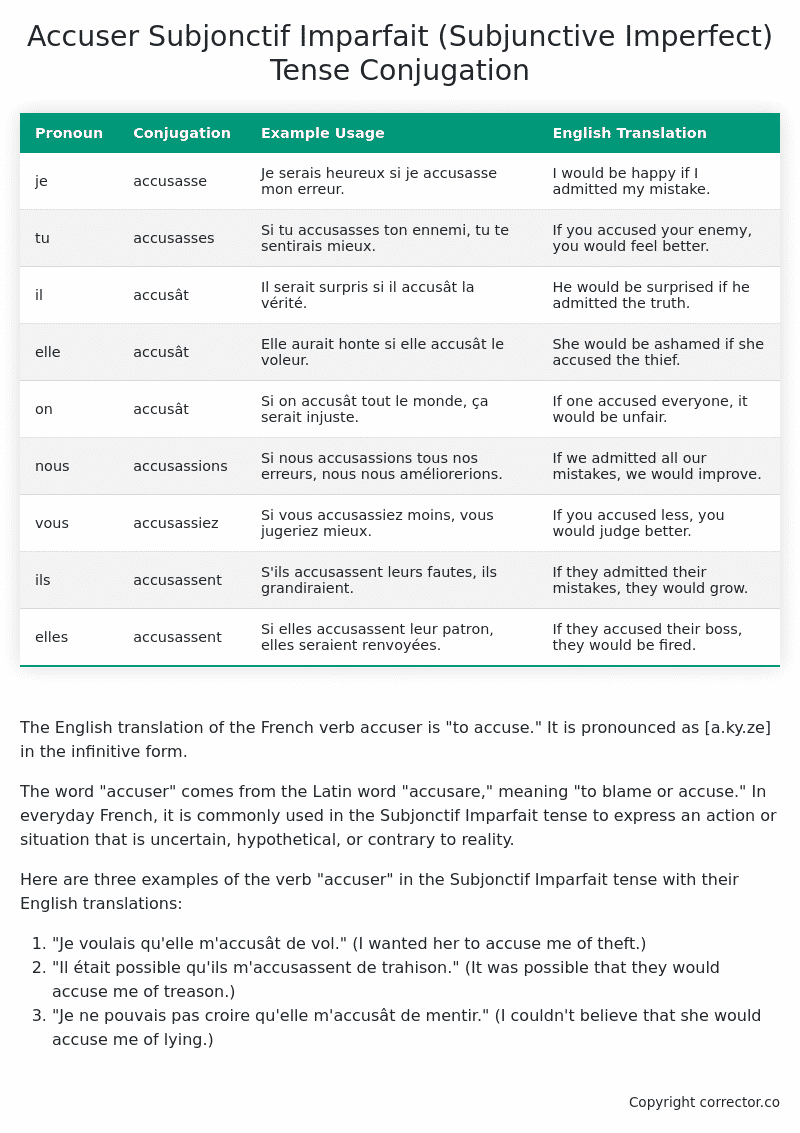Subjonctif Imparfait (Subjunctive Imperfect) Tense Conjugation of the French Verb accuser
Introduction to the verb accuser
The English translation of the French verb accuser is “to accuse.” It is pronounced as [a.ky.ze] in the infinitive form.
The word “accuser” comes from the Latin word “accusare,” meaning “to blame or accuse.” In everyday French, it is commonly used in the Subjonctif Imparfait tense to express an action or situation that is uncertain, hypothetical, or contrary to reality.
Here are three examples of the verb “accuser” in the Subjonctif Imparfait tense with their English translations:
- “Je voulais qu’elle m’accusât de vol.” (I wanted her to accuse me of theft.)
- “Il était possible qu’ils m’accusassent de trahison.” (It was possible that they would accuse me of treason.)
- “Je ne pouvais pas croire qu’elle m’accusât de mentir.” (I couldn’t believe that she would accuse me of lying.)
Table of the Subjonctif Imparfait (Subjunctive Imperfect) Tense Conjugation of accuser
| Pronoun | Conjugation | Example Usage | English Translation |
|---|---|---|---|
| je | accusasse | Je serais heureux si je accusasse mon erreur. | I would be happy if I admitted my mistake. |
| tu | accusasses | Si tu accusasses ton ennemi, tu te sentirais mieux. | If you accused your enemy, you would feel better. |
| il | accusât | Il serait surpris si il accusât la vérité. | He would be surprised if he admitted the truth. |
| elle | accusât | Elle aurait honte si elle accusât le voleur. | She would be ashamed if she accused the thief. |
| on | accusât | Si on accusât tout le monde, ça serait injuste. | If one accused everyone, it would be unfair. |
| nous | accusassions | Si nous accusassions tous nos erreurs, nous nous améliorerions. | If we admitted all our mistakes, we would improve. |
| vous | accusassiez | Si vous accusassiez moins, vous jugeriez mieux. | If you accused less, you would judge better. |
| ils | accusassent | S’ils accusassent leurs fautes, ils grandiraient. | If they admitted their mistakes, they would grow. |
| elles | accusassent | Si elles accusassent leur patron, elles seraient renvoyées. | If they accused their boss, they would be fired. |
Other Conjugations for Accuser.
Le Present (Present Tense) Conjugation of the French Verb accuser
Imparfait (Imperfect) Tense Conjugation of the French Verb accuser
Passé Simple (Simple Past) Tense Conjugation of the French Verb accuser
Passé Composé (Present Perfect) Tense Conjugation of the French Verb accuser
Futur Simple (Simple Future) Tense Conjugation of the French Verb accuser
Futur Proche (Near Future) Tense Conjugation of the French Verb accuser
Plus-que-parfait (Pluperfect) Tense Conjugation of the French Verb accuser
Passé Antérieur (Past Anterior) Tense Conjugation of the French Verb accuser
Futur Antérieur (Future Anterior) Tense Conjugation of the French Verb accuser
Subjonctif Présent (Subjunctive Present) Tense Conjugation of the French Verb accuser
Subjonctif Passé (Subjunctive Past) Tense Conjugation of the French Verb accuser
Subjonctif Imparfait (Subjunctive Imperfect) Tense Conjugation of the French Verb accuser (this article)
Subjonctif Plus-que-parfait (Subjunctive Pluperfect) Tense Conjugation of the French Verb accuser
Conditionnel Présent (Conditional Present) Tense Conjugation of the French Verb accuser
Conditionnel Passé (Conditional Past) Tense Conjugation of the French Verb accuser
L’impératif Présent (Imperative Present) Tense Conjugation of the French Verb accuser
L’infinitif Présent (Infinitive Present) Tense Conjugation of the French Verb accuser
Struggling with French verbs or the language in general? Why not use our free French Grammar Checker – no registration required!
Get a FREE Download Study Sheet of this Conjugation 🔥
Simply right click the image below, click “save image” and get your free reference for the accuser Subjonctif Imparfait tense conjugation!

Accuser – About the French Subjonctif Imparfait (Subjunctive Imperfect) Tense
Formation
Common Everyday Usage Patterns
Interactions with Other Tenses
Subjonctif Présent
Indicatif Passé Composé
Conditional
Conditional Perfect
Summary
I hope you enjoyed this article on the verb accuser. Still in a learning mood? Check out another TOTALLY random French verb conjugation!


